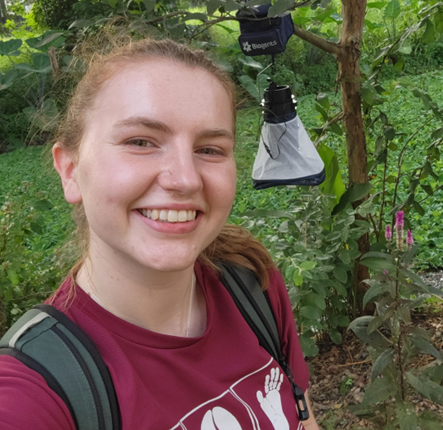Researcher Spotlight - Erin Johnston
Published: 18 December 2024
In this installment of Researcher Spotlight, PhD student Erin Johnston details her research on the xenosurveillance of Japanese encephalitis virus (JEV) in the Philippines via the mosquito vector.

Can you tell us about your background?
I grew up in a small town outside of Glasgow called Lanark before moving here to study my undergraduate in Veterinary Biosciences. I really enjoyed learning about research about human, animal and environmental health so pursued a masters in One Health at Utrecht University in the Netherlands.
What can you tell us about your PhD?
My PhD focuses on the xenosurveillance of Japanese encephalitis virus (JEV) in the Philippines, meaning I am working on surveying JEV via the mosquito vector. JEV is mainly spread by Culex mosquitoes, can infect many different hosts, including humans, and is endemic in Asia and Australia. My work takes place in a variety of environments from the lab, to fieldwork and eventually the modelling world.
What is the focus of your research?
I am currently working in the lab on a new method to determine which animals' mosquitoes have been feeding on that's cheaper and faster than the current methods. This is important because depending on what the mosquitoes eat changes how the virus will spread. My fieldwork focus is in the Philippines where I catch mosquitoes in the wild. I work across three different provinces in Central Luzon and set traps in a variety of sites to see if there is any changes in mosquito population dynamics. Finally, I hope to combine mosquito feeding preferences and their population dynamics with ecological data to predict where JEV will infect humans.
Why did you decide to do your PhD at SBOHVM?
I did my honours project within the School during my undergrad and I learned about the Wellcome Trust programme at Glasgow. When I got a place on the programme my supervisors and I came up with a PhD project that suited my interests and had collaborations internationally with FETPAFI and University of Sydney. I also found the research community and collaborative nature of SBOHVM to be very welcoming!
What do you find most interesting about your work? What has been the most positive aspect so far?
I find my field placements the most interesting part of my work because I love how immersive they are and the opportunity to travel to areas of the world I wouldn't normally go to is a big bonus. Additionally, I hope my work will have a real impact as JEV is a neglected tropical disease in the Philippines, so there is gap in the research. My most positive aspect so far have been my supervisors and international collaborators, their enthusiasm for the project helps to keep me motivated!
What advice would you give to anyone doing or considering PhD?
Make sure you have space outwith your project where you can switch off from your PhD, be it a sports club or friends who are not PhD students. It helps you realise that although your work may be stressful at the moment, it's not the be all and end all.
Tell us about your future plans.
I still have 2 years to go so I don't have any concrete plans. I can see myself working for an NGO as by the time I graduate I will have spent the last 10 years at university so want to get more experience outside of academia!
First published: 18 December 2024

